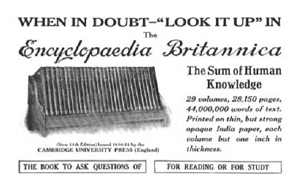

People frequently assume that I'm a Wikipedian. On the face
of things I suppose that that's a rather logical assumption. I write rather
obsessively (and certainly more obsessively than elegantly), there are at least
a handful of topics with which I'm familiar enough to perhaps make passing on
my knowledge a worthwhile endeavor, and I hold a deep-felt conviction that the
web should be a repository for human knowledge. I'm also a strong believer in
the power of the collective. And as though that's not enough, I've been following
the Wikipedia from long before it skyrocketed into being a favorite web property.
With all of these characteristics, my confession that
not only have I never written anything in the Wikipedia, but that I honestly
have no urge to do so, has caused more than a few eyebrows to be raised.
Admittedly, there seems to be something strange going on
here. How can someone who seems to so fully fit the image not be taking an active
role in such an important and impressive collective knowledge enterprise? My
reasons are both pragmatic and ideological (and stem
from experience as well). I definitely think that there's
a need for an encyclopedic resource on the web. What's more, as far as resources
go, I don't find much fault with the Wikipedia.
My problem with the Wikipedia is that, as I've become more and more convinced
over the last few years, such a resource goes against the very essence of the
web.
 |
Personally, I find it quite strange that among all the questions that might be asked about the Wikipedia, or for that matter, about any encyclopedia, one basic question seems to be readily, almost willingly, passed over, perhaps even purposefully avoided: Just why is it that we want an encyclopedia, anyway? There's no doubt that an encyclopedia is a source of information, perhaps even of knowledge. But it's the sort of source that provides answers to questions rather than generates questions. We expect an encyclopedia to be definitive. We turn to it because we find it hard to live with doubt. That being the case, the actual fact that we've learned is ultimately less important than the fact that we've found a fact, and that after finding what we were looking for, we're no longer in doubt. We may not know everything, but everything is knowable. |
A desirable text is more than a collection of accurate references. It is also an expression of personality.That's a lot of quoting. Perhaps even too much. But in this particular instance, it's also a way of allowing Lanier's voice to come through. And that, at least in part, is the point. Rather than trying to be objective, Lanier is presenting us with an opinion that reflects his own experience. It's certainly nice to be presented with facts - I'm quite happy to get them, to learn them, to learn from them. But it's a package deal, and often it's at least as important that we know where those "facts", and whoever is reporting them, are coming from. Of course when a group works on something, the individual idiosyncrasies that ordinarily accompany each voice are almost unavoidably muted. The seasoning gets toned down and an across the board blandness takes its place. Some people see this as a suppression of their own particular contribution, and they find it difficult to embrace what the group has created if it means that their distinctive contribution has been swallowed by the whole. This tension between the desire to be part of a larger group effort, yet also to maintain a clear and separate identity is certainly understandable, but it's not part of why I don't contribute to the Wikipedia.
For instance, most of the technical or scientific information that is in the Wikipedia was already on the Web before the Wikipedia was started. You could always use Google or other search services to find information about items that are now wikified. In some cases I have noticed specific texts get cloned from original sites at universities or labs onto wiki pages. And when that happens, each text loses part of its value. Since search engines are now more likely to point you to the wikified versions, the Web has lost some of its flavor in casual use.
When you see the context in which something was written and you know who the author was beyond just a name, you learn so much more than when you find the same text placed in the anonymous, faux-authoritative, anti-contextual brew of the Wikipedia. The question isn't just one of authentication and accountability, though those are important, but something more subtle. A voice should be sensed as a whole. You have to have a chance to sense personality in order for language to have its full meaning. Personal Web pages do that, as do journals and books. Even Britannica has an editorial voice, which some people have criticized as being vaguely too "Dead White Men."
Return to Luftmentsh